Lessons on Sustainable Growth: The second year of EA Hungary
Just like the first year’s review, I will be writing this from my point of view, to (hopefully) best show the type of challenges I was facing in my second year after founding EA Hungary.
How to read this post
If you are interested in the specific things our group has done, just continue reading after this section.
If you are interested in more abstract level CB strategy, read my sequence called Experiments in Local Community Building.
If you are less interested in the specifics but would like to read about some general lessons after the second year, read the general thoughts section.
Our group’s structure
We have members in three different cities, however, around 95% of us live in Hungary’s capital, Budapest. Back in 2021 Fall, I started a university group at ELTE (Eötvös Lóránd University), which turned very quickly into a city-wide university group. During the second year, our outreach efforts only targeted university students, but sometimes early career professionals also found our programs (which we are very happy about!). We also have a couple of members who found out about EA by themselves and reached out, and some were already reading the EA/LW forums before our group was founded.
2022 Fall semester
2022 September to 2023 January
Courses
In last year’s report, I called our approach the 4+4 session intro fellowship. We continued doing the same, but I now have a much better write-up on the reasoning behind this in “Consider splitting your fellowships into two parts to increase sign-ups”.
We had 21 applications, with 14 people starting the fellowship and 12 finishing the first 4 sessions. Of these 12, 10 of them continued to do the second half, and all of them finished it successfully.
We had another 4 people finish the fellowship through a partnership with an “academic dormitory”. This is seemingly a unique concept in Hungary.
We have also run the in-depth fellowship for 15 people, but I didn’t exactly record how many of them finished it, and we didn’t do a good job of getting people to fill out the feedback form either.[1] Since then we have been making sure people do the feedback form at the end of the last session. We recommend other groups to do the same to increase the response rate!
We have also run the “Cause area exploration” and “Career planning” fellowships for 5-5 people, which refer to tracks 1 and 2 of this course here, respectively.
We also piloted a wellbeing course for our members, which had 13 participants. The results of this seemed paradoxical, as people have told us that they got a lot of value from it and that they were grateful for being able to take part, however, the attendance rate was quite low. For this reason, we didn’t end up running it again.
Public events
In 2022 November, Gergő gave an intro talk on EA to about 40 professionals (mostly engineers), due to an invitation to a tech company through one of our members. It was well received and some people mentioned that they would be interested in learning about EA. 4 of them signed up to our reading group. We were facilitating a follow-up online talk by GWWC for the whole company ~6000 employees, but as of now this hasn’t happened, as they backed out due to some reputational concerns about EA. We think this is quite unfortunate, although the talk still may happen eventually (it will have to be organized by volunteers at the company, not the company’s events/HR team).
We also ran an online event collaborating with EA Bonn and Effective Thesis. Only around 4 of our members attended, although one person did sign up for coaching afterward.
Socials, meetups
At the time I was organizing weekly socials for the community in Budapest, with about 5-8 attendees per social. We also organised an intro social for course participants which we think is quite important to have. Also had a hike for ~10 people which was fun.
We also organized a Christmas party which was attended by ~30 people, and a psychology meetup with lightning talks that had ~16 people.
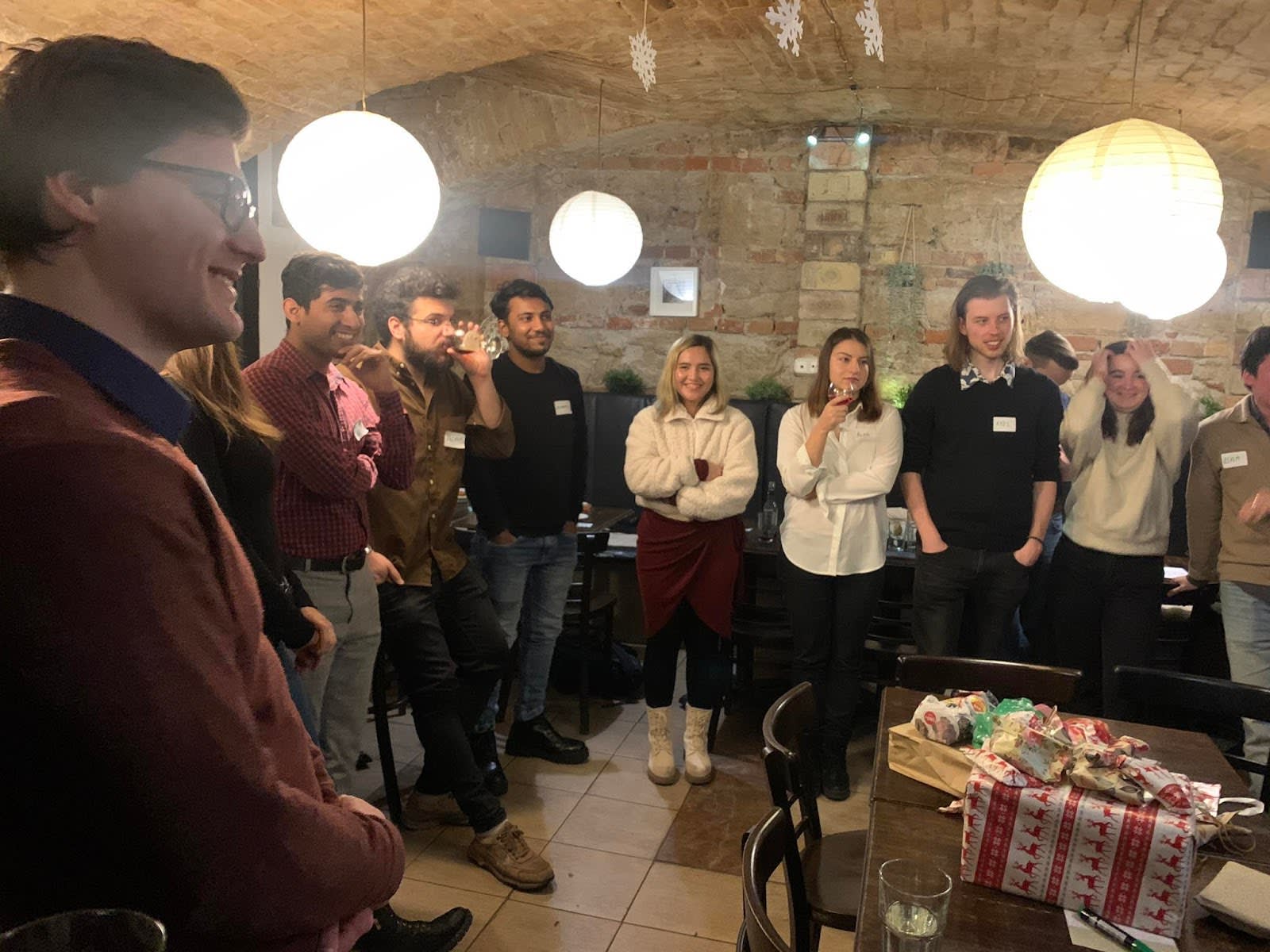
EA Pécs and other cities
I wanted to mention separately that Pécs, a city on the south-western side of Hungary had its first meetup with ~13 people. I was really happy about this, as this was our first official event that happened outside of Budapest. Unfortunately, we didn’t do a great job of encouraging events to happen outside of Budapest since, but this is something I want to do a better job at during our 3rd year.
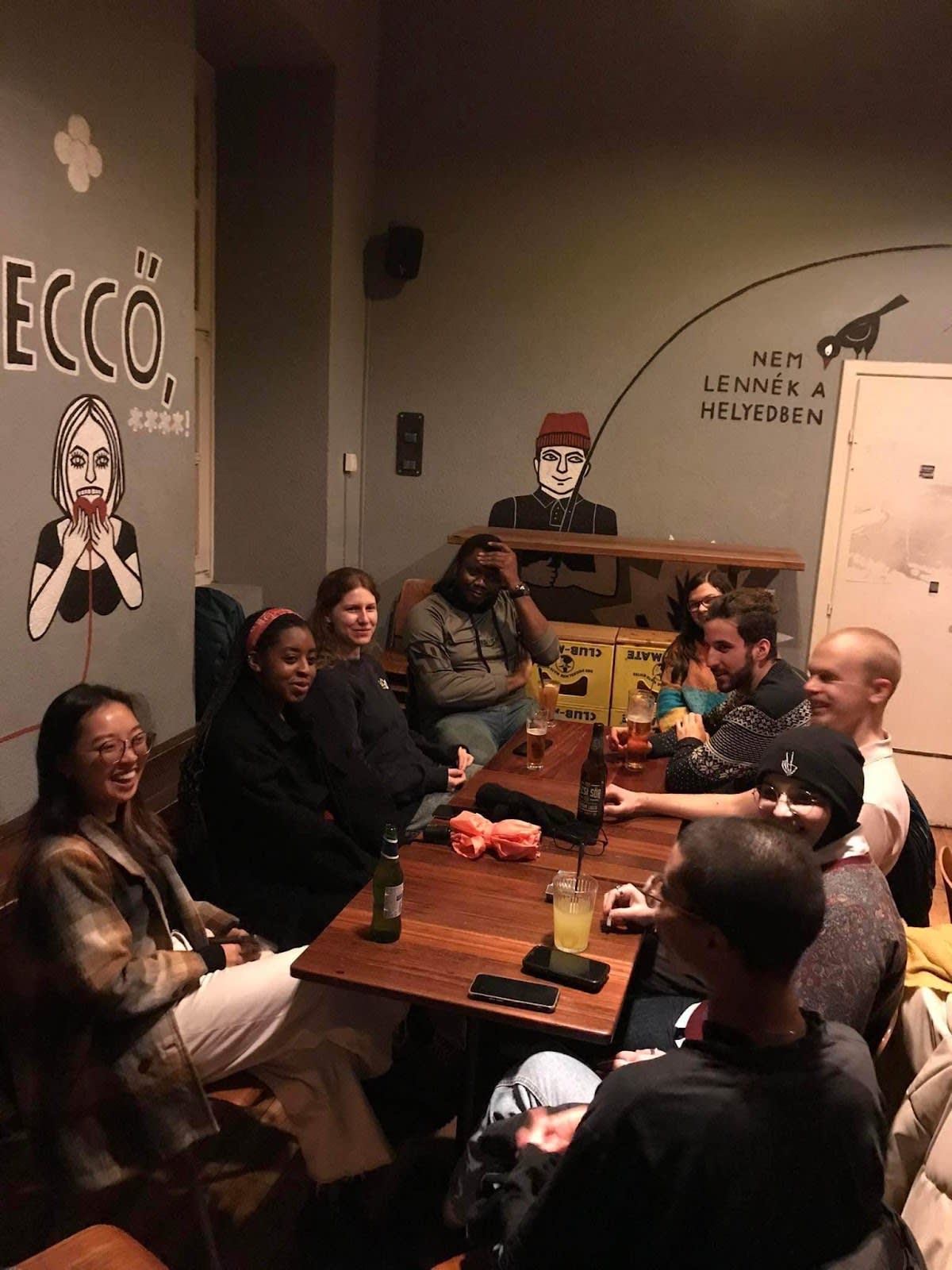
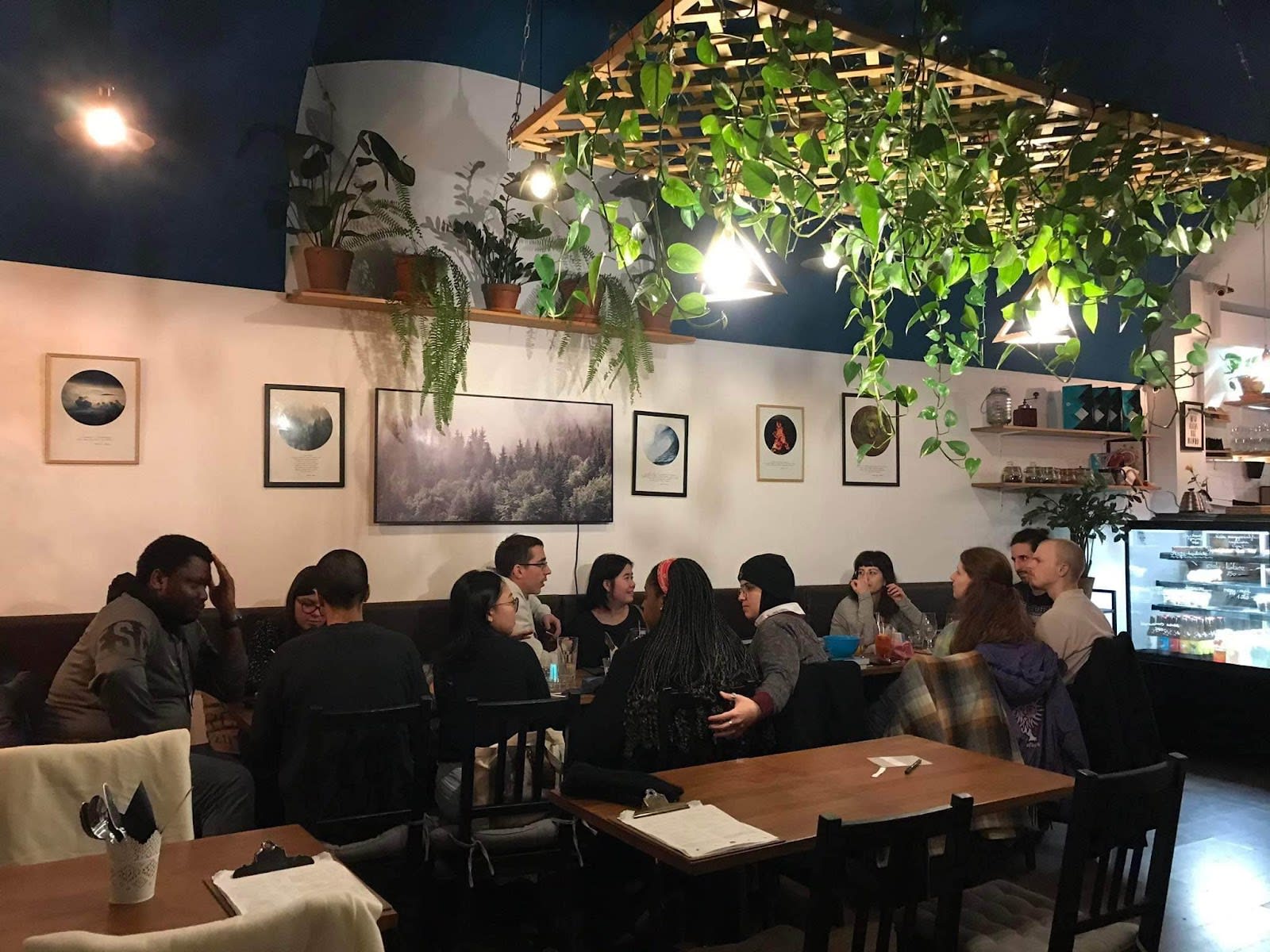
We also have a couple of members based in Debrecen (city in the south-eastern side of Hungary), but it would be a strech to say that there is a group there. For our 3rd year, we plan to extend the marketing of our nation-wide intro program to all mayor cities in Hungary, mainly to seed more university groups.
EAGxRotterdam
During this period EAGxRotterdam happened, to which we have brought 20 people overall, ~18 of which would have likely not gone if EA Hungary didn’t exist.
2023 Spring Semester
From 2023 February to 2023 May
Courses
Before the start of the university semester, we ran a split, intensive fellowship. We had ~33 signups, 29 people starting and 24 finishing the first 4 sessions. Of these 24, 17 finished the second part.
We also ran the usual weekly fellowship during the semester. In this round, only 11 people applied, 9 started and 6 finished part one. Out of them, 5 finished part 2.
One interpretation of these results is that most people who were interested in the fellowship for this time period did it with the pre-semester group (after all, our marketing efforts for the two periods targeted the same audience, ie., university students), however, I’m not quite sure if that’s the explanation. At the time we had very little capacity for marketing properly, and I remember that our paid social media ads that we usually rely on didn’t “get off the ground” either (meaning that the budget we allocated for it wasn’t spent by Meta). I think there might be some diminishing returns on marketing if you run a fellowship twice per semester, but I still think it is likely worth it. Next time I want to try having two fellowships again, but with proper marketing for both rounds.
After marketing the in-depth fellowship through our mailing list, 16 people signed up, with 12 people finishing it.
Socials, meetups, coworkings
We ran the usual intro social for the course with ~15 attendees before the semester started, and an end-of-fellowship social with 16 people.
We also tried out something called “community days”, which is essentially a fancy name for coworking, although people who signed up could also request help for upskilling. We eventually renamed it to “Coworking days” to remove confusion. We ran about 4-5 of these, with attendance between 6-12 people.
Strategy meetings
In this period we also started having strategy meetings every 2 weeks. They are usually in person, although people can join online as well. They are attended by the core organizing team (people on a salary are expected to be present), but volunteers are also encouraged to join. I think these are really valuable for coordination and help me get a better sense of what’s going on “on the ground”. - I wish we started them earlier!
Newsletter
In 2023 May we launched a monthly newsletter that we send to people on our mailing list. The first edition was sent to 162 people.[2] We try to not spend too much time on these, hoverer I think having at least an MVP is worth it. If you are organizing a new-ish EA group and don’t have the capacity to write one yourself, feel free to shoot us an email at info@eahungary.com—we can share our newsletter drafts with you each month, and you should be able to adjust it for your group with little effort. Here is what our newsletter looked like in a given month, so you can get a sense of the content.
AIS group
During this period a separate group called Budapest AI Safety sprung out, about which you can read about in a separate report (hyperlink to be shared here shortly).
2023 Summer
Courses
Intro-fellowship
We ran a weekly intro fellowship in the Summer with 13 people. Just like the Spring semester’s weekly fellowship, the marketing didn’t go too well this round, as we had some internal troubles at the time. Of these 13 people, 8 people finished the 1st 4 sessions and 5 did the full fellowship. I originally wanted to run more than one fellowship during this period, but again, we just didn’t have the capacity at the time.
In-depth fellowship
We had applicants for one group but unfortunately, it never got off the ground. This was a bit disappointing given how many people have done the intro fellowship already, even though my sense is that in-depth fellowships generally have a low signup rate. One thing I’m confused about is that last year we had a lot of people signing up for our summer intro programs, which indicates to me that university students should generally have time for these courses. However, students who were in our network already seemed very busy with work, vacation, etc., and didn’t sign up for the in-depth course either this or last year. One thing we might try in the future is running an intensive version of the in-depth fellowship, as people have to commit for a shorter duration which might work better over the summer break.
EAGxWarsaw
Our community from Hungary brought overall about 28 people, of which (based on my best guess) counterfactually ~24 people wouldn’t have gone otherwise. Some of these people came through AIS Hungary though, but due to the overlap between the two communities, it’s a bit hard to estimate the exact numbers.
EAGxBerlin
Just as last year, I will conclude this section with the group photo from the Berlin conference in early Fall. We had much fewer people attending this year, as the target audience for the conference shifted, so it was harder for people from eastern Europe to get in. It was still a great experience for many of us! Overall about 13 of us were there, and I guess that ~9 people would not have been there have EA Hungary had not existed.
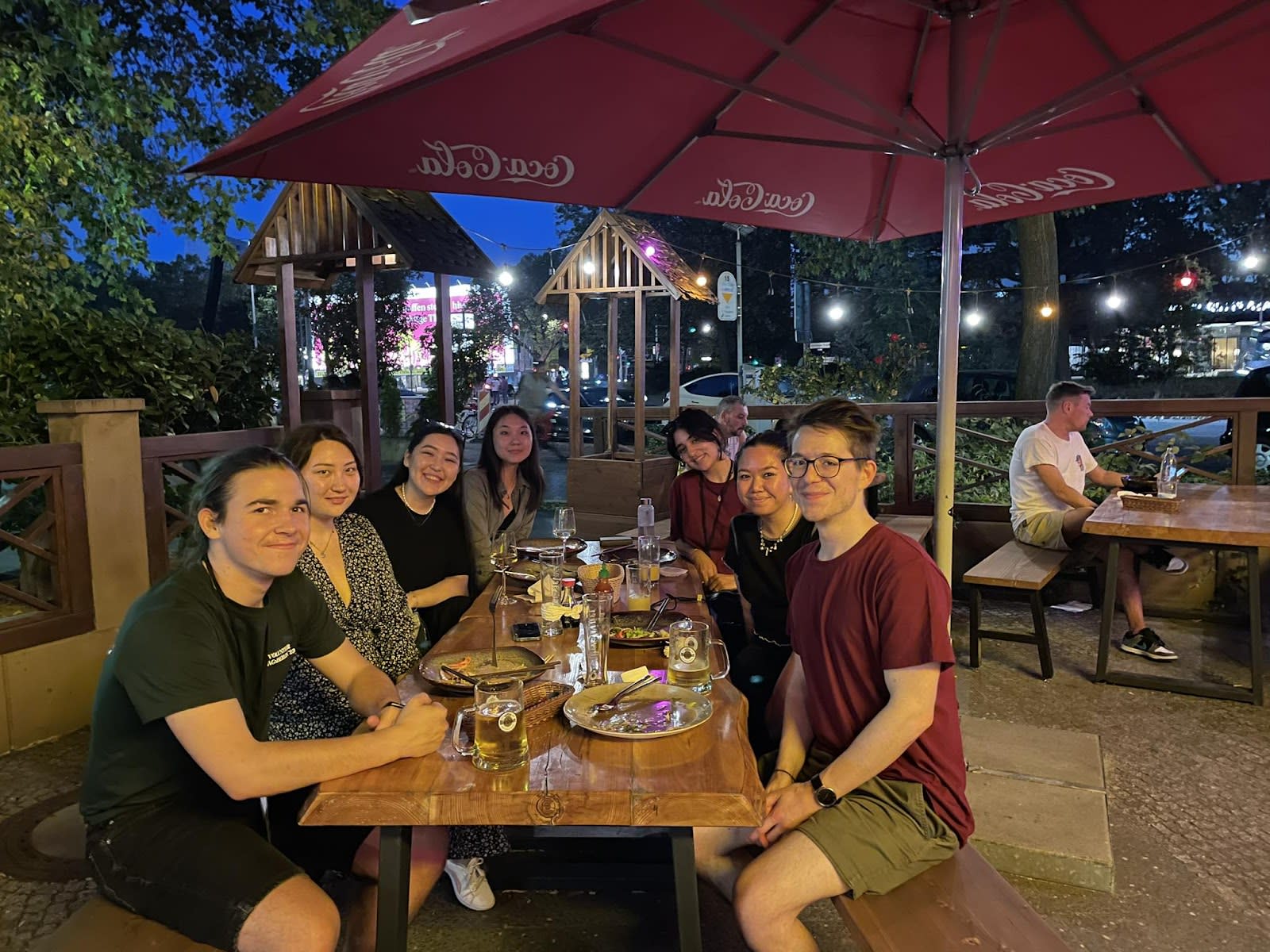
General thoughts
Below I will outline some short and general thoughts reflecting on the past year. These thoughts are between “abstract strategy” (see the sequence) and “the specific things we have done” (see above), but overall land closer to the strategy side.
On Hiring and Management
One of the biggest mistakes this past year was wanting to grow our organisation too quickly. In retrospect this was quite naive, even considering there was much more funding available for CB at the time I made the decision to hire more people. I wish I had read things such as Get ambitious slowly and Holden’s We can’t (simply) buy capacity. I also made a lot of mistakes when it comes to management. I feel a bit embarrassed to admit it now, but at the time I didn’t think of management as a skill that someone has to get good at. I wish I had done some upskilling first so as to prevent predictable issues (e.g. communication problems, expectations not being clear enough), as dealing with unpredictable ones would have been more than enough. I also wish I had asked for help from CEA earlier, but this was largely during the FTX crisis, so I was thinking they had much bigger issues to worry about. Since then I have become much better at this, although I still have plenty of room for improvement. Some specific things that I found pretty helpful since: regular check-ins, regular “meta-conversations” where you specifically talk about issues and how to work together more effectively, strong onboarding, regular in-person co-working, and writing up a “collaboration document” that clearly outlines specific responsibilities.
On calls
Compared to the first year, I didn’t closely track the number of calls I had. I quickly ran through my calendar for the 2022 Fall semester and roughly counted ~105 calls.[3] I’m not sure how representative that is of the entire year, but a general takeaway I had is that in the future I want to spend more time on doing “career advice/mentoring calls” for our members. I think these can be extremely valuable but also easy to neglect, so that’s something I want to do better on. I was also surprised to see how many calls I spent on management.
On Community Health
Throughout the year we have had several community health issues from mundane to pretty serious ones. When it was needed, I was always able to get amazing help from CEA’s CH team, for which I’m very grateful for <3
Another thought on this is that I now feel I could have been more explicit about what I want our community’s culture to be like, and be somewhat more likely to follow up on minor community health issues compared to being like “okay if this comes up again I will talk to this person but let’s not spend time on this for now”. This is tricky to balance as you certainly don’t want to police your community, but given that I’m quite agreeable I was always happy to reason myself out of having to explicitly deal with community health concerns when I could. I’m hoping that if in the future I catch myself doing this, I will be a little more likely to act, without going overboard.
On Marketing the intro program
Getting the word out about our fellowship continues to be a major bottleneck for us. For that reason, as well as me having read this and this I’m planning to focus more on our online appearance, as well as optimize our social media ads and increase their budget.
On socials
Over the year, we have run quite a lot of social events, with varying success. Overall I have updated away from priorizing socials. I think they are great and should happen, but I’m now hoping to have them run by volunteers or happen more organically, as opposed to putting serious effort into organizing them by our staff. We will still organize at least one social per intro course, as well as have at least one MVP-type meetup per month though, so there is something to turn up to for people who are currently not enrolled in our courses.
On measuring impact
This report is mainly focused on describing the type of programs we ran, how we ran them, and some strategic considerations behind them. These are all instrumental to what we ultimately want to achieve, which is more talented and thoughtful people contributing to EA cause areas. I try to do my best to keep track of what our community is doing and celebrate successes, however, the aim of this writeup is not to systematically measure our impact or cost-effectiveness.[4]
On Newsletters
Just to repeat what I wrote above: If you are organising an EA group and don’t have capacity to write monthly newsletters yourself, feel free to shoot us an email at info@eahungary.com—we can share our newsletter drafts with you each month, and you should be able to adjust it for your group with little effort. Here is what our newsletter looked like in December, so you can get a sense of the content.
On writing reports
Overall I spent a good amount of time writing this report, especially the sequence of Experiments in Local Community Building. I’m pretty uncertain as to whether it was worth putting that much effort into them. One thing I’m certain of is that it would have been better to write up some drafts right after each semester ended, as I’m sure I have forgotten a couple of lessons that I thought were important at the time. Live and learn!
Next Steps
Our original strategy for the 2023 Fall Semester can be read here. Since then we have somewhat updated on these plans, I will soon share that in our upcoming interim report.
Concluding thoughts
Like for many of us in the EA community, this past year had plenty of challenges for EA Hungary. I feel I have made many mistakes, but have also learned about CB strategy quite a lot in the overall process. I’m enthusiastic about going forward with our team, as well as carefully growing our organisation further. Wish us luck!
Thanks to Amarins, Catherine, and Frantisek for giving advice to our group as well as Dia, Dóri, Athraa, Cristina, Eugen, Noémi, Rain, Peti, Julcsi, Zineb, and Melinda who have put invaluable work into creating and growing our group.
Thank you to Milán Alexy for reviewing this draft.
- ^
We only got 2 responses.
- ^
Data on subsequent newsletters can be found here.
- ^
About 50% of these were on staff management, 30% was “mentoring calls” for our members the remaining 20% could be roughly described as “connection calls” meaning mostly talking to other community builders, or people outside of EA Hungary who I had to talk to for work-related reasons. A couple of these were with CEA staff for CB or CH advice.
- ^
I realize it might come across as ironic that I don’t say much more about this here, but I feel a bit iffy about writing down something like “x got a job at y, and n number of people significantly changed their career trajectory. I do try to keep track of how we support, to what extent and what are my best guesses about the counterfactual impact we had on their career—but I feel this is somewhat sensitive information that includes a lot of guesswork, so I would rather not share it publicly even with everything anonymized.
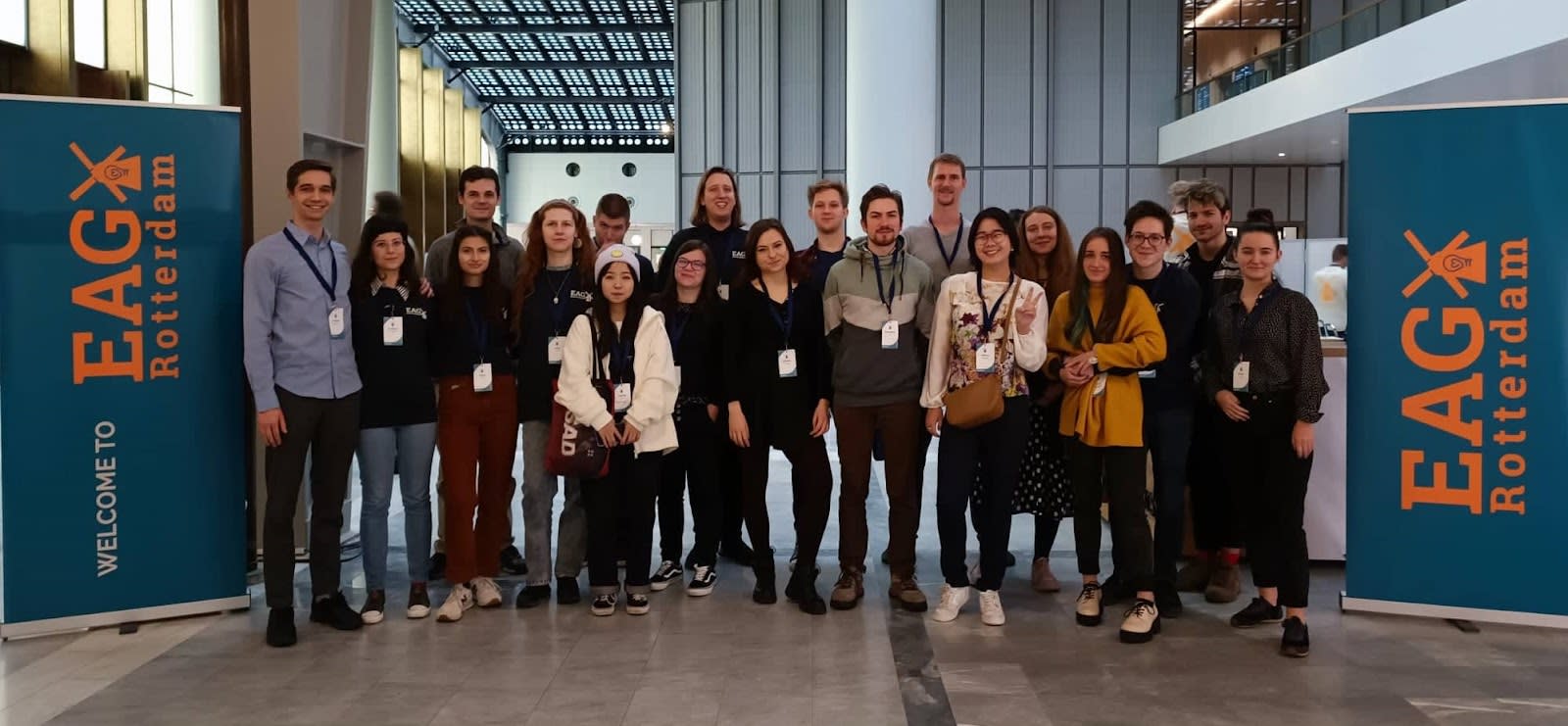
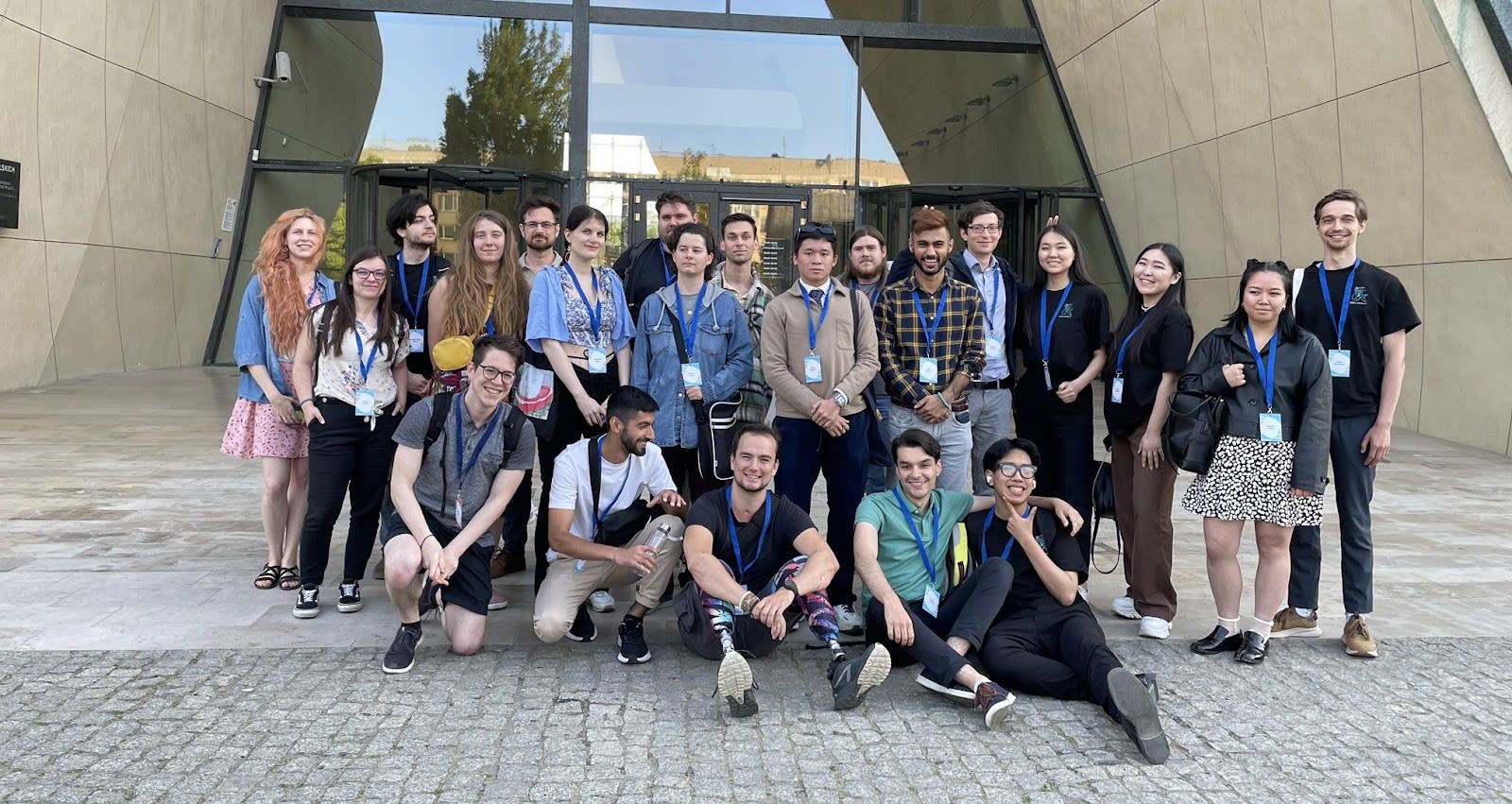
Executive summary: In the second year after founding EA Hungary, the group grew significantly through university outreach and courses, while facing challenges with hiring, management, marketing, and community health.
Key points:
Ran intro and in-depth fellowships each semester with decent attendance, while struggling with consistent marketing and measuring impact.
Hosted events like talks, conferences, meetups, and socials with varying levels of success.
Faced issues with wanting to expand staff too quickly without proper management skills. Learned the importance of regular check-ins and clear expectations.
Community health challenges emerged, requiring help from CEA’s team. Could have been more proactive with minor issues.
Planning to focus more on online presence and optimizing social media ads to improve marketing of intro programs.
Writing reports and newsletters took substantial time; uncertain if fully worthwhile.
Made mistakes but learned a lot about community building strategy. Enthusiastic to continue carefully growing the organization.
This comment was auto-generated by the EA Forum Team. Feel free to point out issues with this summary by replying to the comment, and contact us if you have feedback.